Building JustWatch, Part 1: A company culture that really works
February 5, 2017
This post is part of a series on building JustWatch.
Find the other posts here: Part 1: A company culture that really works, Part 2: Audience as a Service, Part 3: to be announced
Introduction
It’s been 2 years since we officially launched the JustWatch webapp in February 2015. A lot has happened and we have come quite far. This is the perfect opportunity for me to look back on what we have achieved:
- From 0 to 40 staff: The team keeps growing
- Offices opened in Berlin and Los Angeles
- Launched in 25 countries and on every continent
- Millions of app downloads and new users every month
- Over 50 million anonymized profiles of movie fans worldwide
- Doubled efficiency of trailer advertising campaigns for our clients
- Working with studios like Sony, Paramount and Fox from the US to Europe to Asia
- Reached millions of EUR in revenue and achieved profitability in late 2016
We are very proud of these achievements and very excited for what the future holds, but, how did we get this far in such a short time?
In the upcoming posts I am going to take the time and try to explain to everyone interested in JustWatch how we built the company from scratch, how we chose our business model, how we work and much more. (Read the second post here)
This first post focusses on our culture and core values, because we feel they are the foundation of the company and every major decision we make.
I will go into a lot of detail in this post and I will start by telling you how our core values developed and why they are so important to us. Then, I will go deeper into explaining the three aspects of our culture and core values and give you examples of how they guide our daily business.
Let’s get started:

A bit of background
Company culture and core values are often dismissed as marketing bullshit displayed on the wall in a company’s lobby or on its website. You would be right to believe that most of these companies only apply their values 10-20% of the time. I want to show you that JustWatch actually bases every major decision on its core values and lives by them every single day.
This is the written version of our culture and core value session, which I give to every new member of the team in their first week of work.
JustWatch was founded by me (David Croyé) and 5 co-founders at the end of 2014. All of us had worked in leading roles at successful international tech-startups in Berlin and were ready to be a part of the next generation of startup founders.
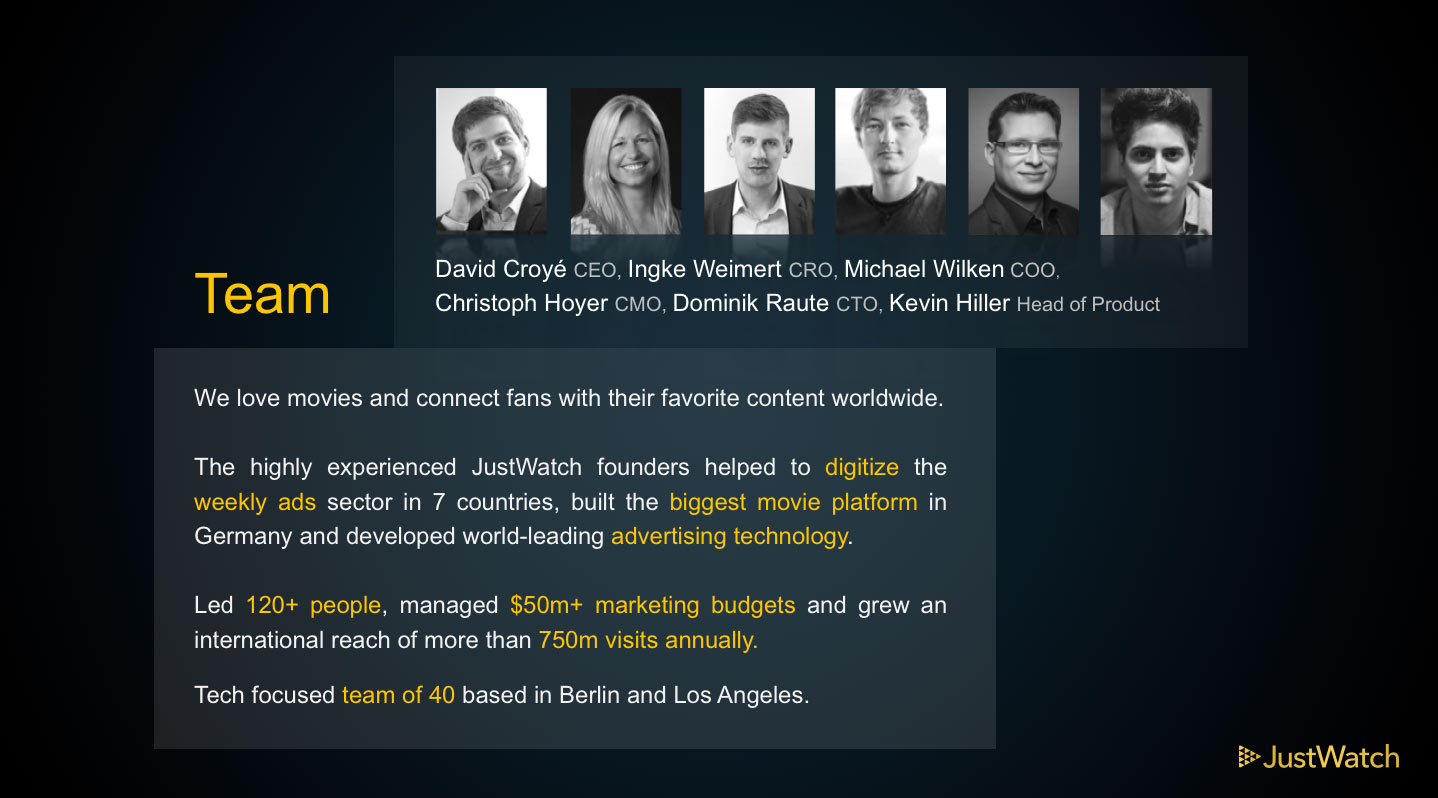
We learnt a lot over the last decade, managed a lot of responsibility and overcame many challenges - most of this experience positive but also some negative. We all felt ready to take what we had learned about ourselves and how to grow, run and exit a successful international tech startup to move onto the next stage of our lives and do it our own way.
I like to use a sports metaphor to describe our journey: We all felt like we had played for top teams in the German Bundesliga, even playing an instrumental role in winning the season, but we were now ready to advance to the Champions League.
We had the experience, a great network, financial resources and most importantly the motivation to start a company in 2014, and so we did.
Our personal ambitions to succeed have always been important to us, but the way in which we succeed and the positive impact we have, is just as important.
Bringing the founders together
After having the idea and concept for JustWatch, what took me the longest time was finding the right co-founders. I was looking for 3 qualities in each of them:
- The same core values and beliefs as myself.
- Hard skills, experience, resources and a network necessary to achieve the goals.
- Personal fit within the group whereby each founders’ key strengths make up for the weaknesses of the others.
After talking with each co-founder for at least 30-50 hours over a few months, we all got together and talked a lot about the idea, the market, goals and big milestones. We talked about topics like leadership, strategy, execution, management, funding, scaling of a company, teamwork, technology, sales, ethics, personal development, life goals and much more. At this point, we knew exactly what JustWatch was going to do. We therefore focussed on and discussed our collective positive and negative experiences to decide how we were going to do it. This was the beginning of the JustWatch culture.
The formulation of our core values
In October 2014 we started working full-speed at JustWatch. As you might know, starting up a company is hard work and you have to put in lots of hours and make a great number of decisions to start it off the right way. However, during this stressful early period, we took the time to meet up every week for a few hours to put our culture and core values into writing. Besides launching as fast as possible, we made this our highest priority. Why? Simple: It would be the foundation of the whole company and the starting point for every major decision.
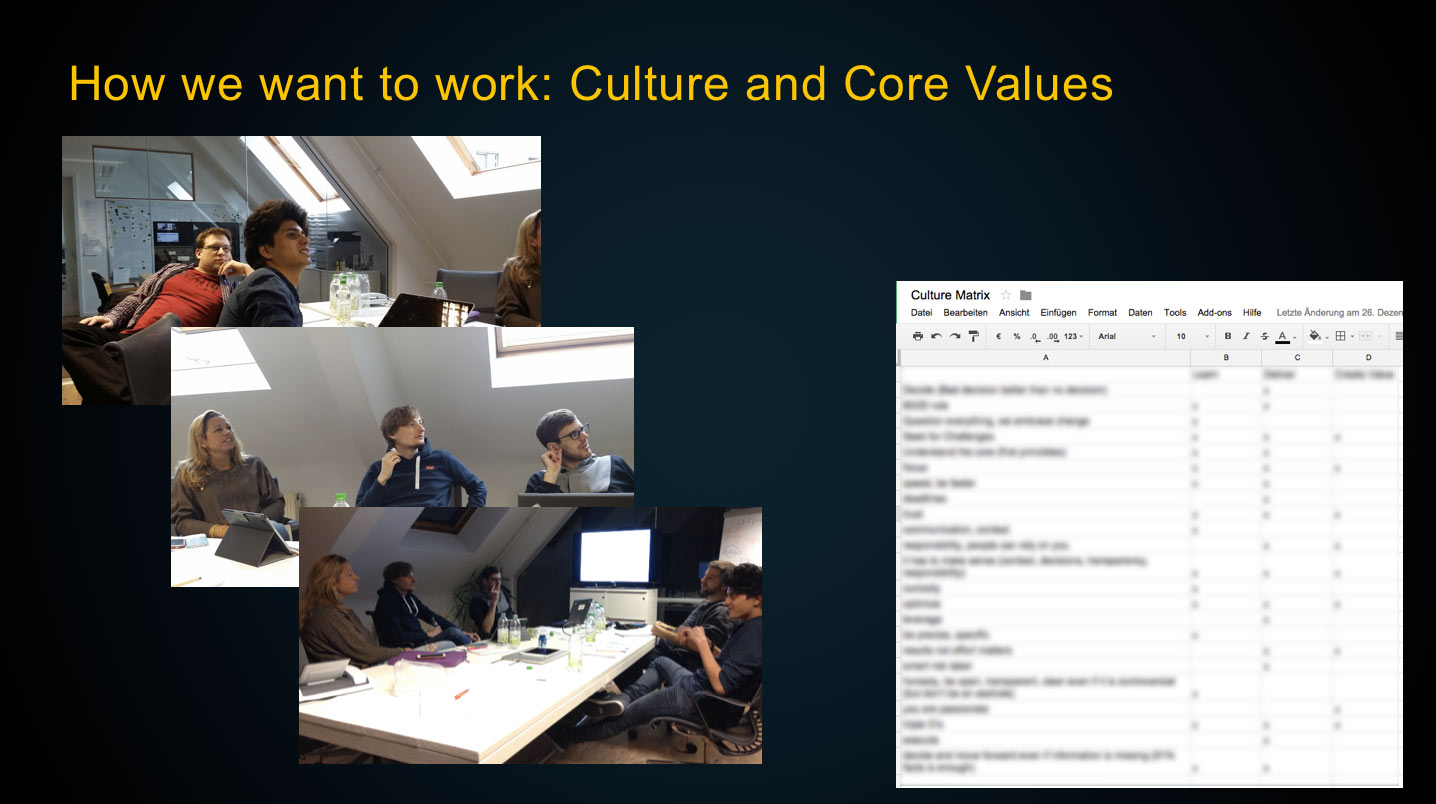
We took around 30 hours to write down a long ‘laundry list’ of our most important ideas, thoughts and beliefs regarding our culture and core values. This list was then boiled down to around 20 slides with the major concepts drawn out for further discussion. During these discussions we realized that everything fitted into three categories: Learning, Execution and Ethics.
For the time being, we decided to sum up the concept into three main slides underneath the tagline “Learn and Deliver Value”.
How we work with the core values
We published those slides on the talent page to help us in our hiring practice and began to use them for the onboarding of new team members.
I took, and still take, the time to talk to all new staff members personally. In their first week of work, we look at our slide deck together and I give them more context about the beginning of JustWatch, how the founder team was formed and what exactly our sometimes cheesy-looking culture and core values mean.
I have received great feedback from new staff about these sessions and how it has helped them to deeply understand what we mean by each core value and this is why I decided to open up and publish this detailed written version of our culture.
What do the core values mean?
The JustWatch core values are split into three categories: Learn, Deliver and Create Value. Below is a description of the deeper meaning of each of the core values as well as a few examples of major decisions that we have based on them to show you that we truly take them to heart. Here goes…
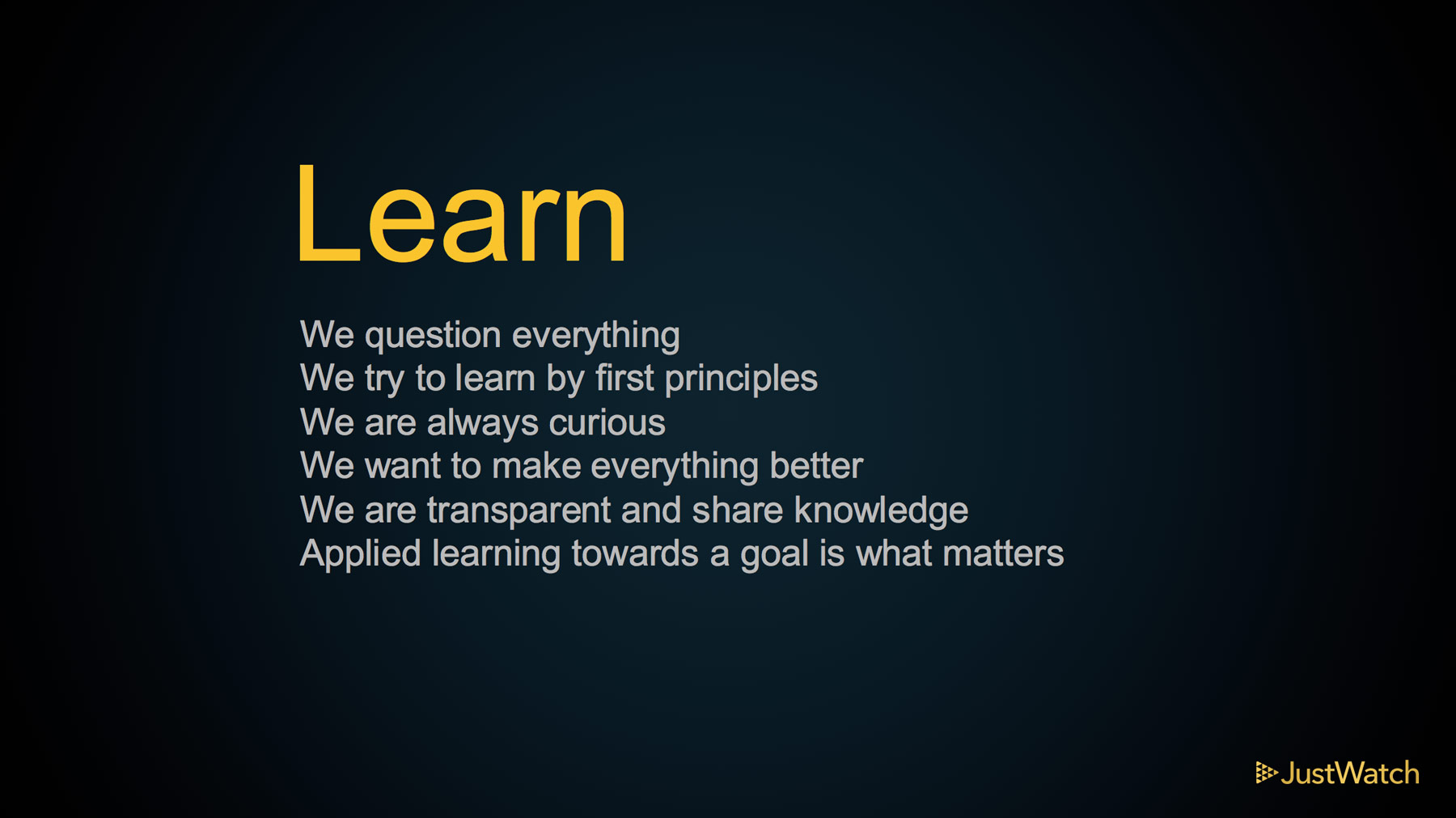
Learn and Improve
Learning is mostly associated with memorizing information at school, college, or university and those who remember best, receive a sheet of paper as “proof” of their achievement. That’s not at all what we mean with learning. When we talk about learning, we talk about real understanding and using what we’ve learned to improve.
So what does real learning mean for us?
- Learning always starts with curiosity, the desire to reach a certain goal or by having a problem that we want to solve.
- The intrinsic need to solve the problem helps us to stay motivated when trying to make sense of something, even if it looks very complex at first.
- The first step to learning should always be figuring out the right questions to ask.
- Learning means to really understand the fundamentals of something and have a good overview of it. If you want to know more about this, see first principle learning by Elon Musk, or tree-trunk learning by Tim Urban 1.
- Applying this knowledge gets easy once you have gained real understanding of the problem - and it has the positive side effect that we never forget it again.
How does real learning guide us?
Examples and Major Decisions
One example is when we chose our business model. Being a learning company had its implications. We decided for a high margin business, despite the usual low margin business model in the media buying industry. This is because we wanted to create a learning environment where making mistakes is not only okay but actually planned for without facing severe consequences. If you have a low margin business model, you need to put a controlling structure and culture in place to make sure that nothing goes wrong. This normally discourages innovation and learning at a fast and iterative pace, and this is the opposite of what we strive for at JustWatch.
You have probably heard the rule “Goals have to be realistic enough to be accomplished”. Well, we don’t agree with it regarding our long term goals. We purposefully set our goals higher than what we can achieve with what we already know. This forces us to learn something new to achieve these goals.
Another example is how we chose our main programming language. When evaluating this, we consulted our company culture and core values - and didn’t focus solely on the technical requirements. We chose Golang, because we knew right away that this would attract exactly the type of people that we want at JustWatch. You cannot study Golang at university but it is exclusively self-taught, which fits our learning environment perfectly.
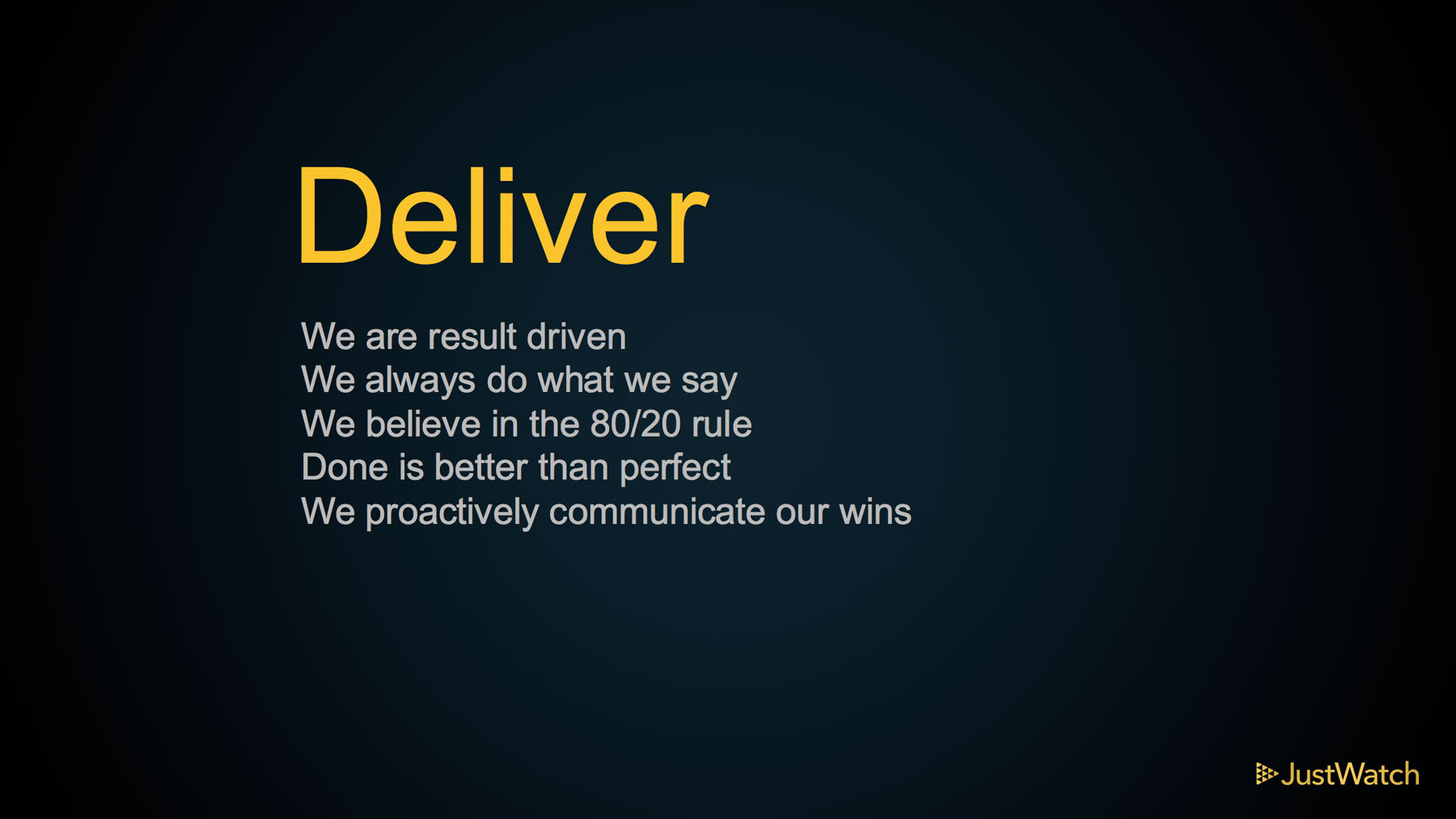
Do what you say
Learning for the pure sake of learning is fine, but doesn’t really help anyone besides oneself. I call this “intellectual masturbation™” (it feels good for you but it doesn’t create value for anyone else). It is for this reason that we are very focussed on delivering.
If I had to choose my most important bullet point from the culture slides, it would be: “We always do what we say”. It sounds so easy, but for me it is the biggest differentiator of successful people and not-so-successful people; the difference between talkers and doers.
It starts with small things like following up by mail when you say you will and introducing two people if you say you will. In my experience, a lot of people think it’s actually more important and polite to say something helpful than actually doing it. What started off with people thinking highly of you always ends up with them trusting you less if you don’t do what you say. It is often better to have said nothing at all.
So what does delivery mean for us?
- We focus heavily on experiments and execution, instead of over-planning and endless discussions. A lot of energy is often wasted in ‘analysis paralysis’ and looking for consensus.
- Delivering does not mean being busy all the time, but being productive and reaching actual results.
- We believe in the 80⁄20 rule (see Pareto Principle). For us, it means achieving excellence in execution, instead of trying to be a perfectionist - which is almost always a waste of time and resources.
- However, to execute the 80⁄20 rule properly, we firstly have to ask the right questions and learn well. Only then will we be able to prioritize the right 20%. This means being ruthless in saying “No” to almost anything that doesn’t have the highest leverage for reaching our goal.
- “Done is better than perfect” is especially important in the early phase. It’s almost always the best idea to roughly prototype something and cut quality corners, for the sake of validating our hypotheses as fast as possible and gathering data on what to focus on next.
- When an individual reaches a goal or learns something important, we always proactively communicate these wins with the rest of the team. This helps to share knowledge and motivates everyone to focus on delivering results.
I’m never satisfied with my achievements, and always have more ideas and higher goals in mind. On one hand, it is a good thing to have a never-ending drive, but on the other hand it can sometimes push your mood down and make you feel like you haven’t achieved anything. It is important to remind ourselves to enjoy and celebrate successes to create a positive momentum.
How does delivery guide us?
Examples and major decisions
Months before we officially founded JustWatch, we built a prototype to validate our core hypothesis. Before being able to talk to potential customers, we needed to find out if we actually could do movie marketing better than anybody else.
Our hypothesis: Targeting movie fans based on their actual movie taste will perform at least 100% better than the common targeting by demographic or general interest in movies.
Therefore, we built a basic movie recommendation algorithm and prototype and did a simple A/B test against Google Ads’ best “Movie Fan” interest targeting. The results were surprising, even for us: 212% better than all existing solutions.
Our potential customers were intrigued. They basically told us that if we build this, they’d work with us.
We didn’t waste our time talking but acted and now had the results to show for it. We asked the right questions, validated our hypothesis and were good to go and build the real thing.
Doing it perfectly or doing it fast?
The best example for “Done is better than perfect” and the 80⁄20 rule was probably how we developed our first version of the website and backend technology: We did it as fast as possible.
We launched in February 2015 in the US and Germany and a couple of weeks later in Brazil. Granted, we only had a fraction of the features we have now. But being movie fans and power users ourselves, we focussed on the most important features first and planned to put in more options later. We basically started with movies only, the most important providers per country, almost no filter options and a crappy search.
We also cut corners when developing our backend technology - although we knew that every compromise we made now would mean that we’d have to refactor it later, which usually takes at least five times longer.
This decision paid off big time: We launched more than 3 months earlier than planned with a TechCrunch article, number 3 on the Hacker News frontpage and top 5 on Product Hunt. We had tens of thousands of users within the first day, received great feedback and collected the first anonymized user profiles for our B2B marketing product.
In turn, this enabled us to develop our advertising and data technology stack and go on the first sales roadshow just a few months after launch. We ran our first test campaigns with clients weeks later and reached product market fit with significant revenue traction quickly.
So if you ask me if it was worth it to refactor the code later on? Yes, 100%. In the end, with what we had learned from running our products, it took us only twice as long to refactor the code instead of the expected five times. And we had already validated our concept and could start scaling the team and the whole company. So doing it right in this case actually meant doing it fast.
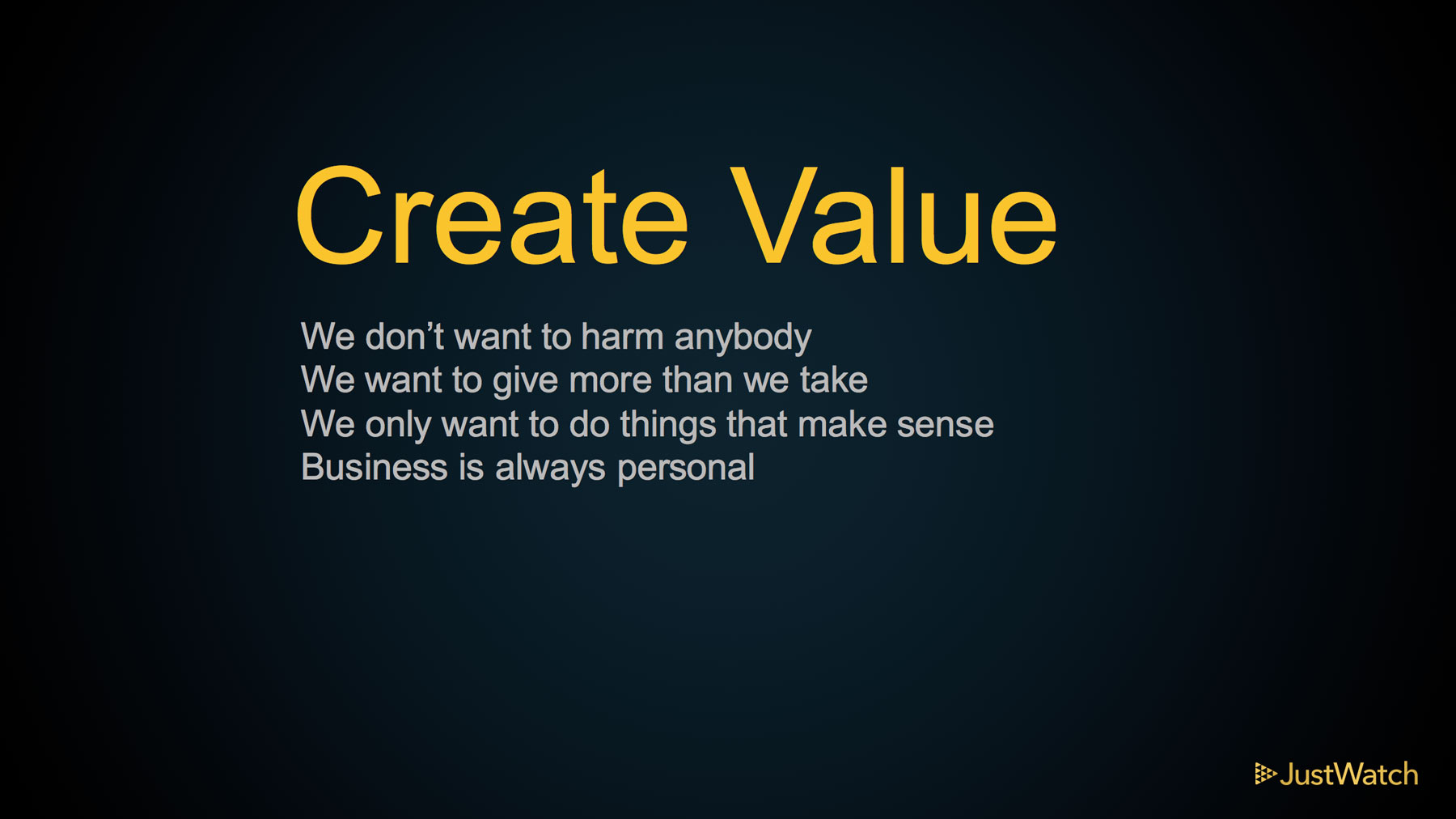
Don’t be an asshole
Our way of doing things has got us pretty far up until this point. But what we are most proud of is the fact that we have not done it on the backs of anyone else. We have taken our slice of cake, whilst making the cake bigger for everyone else.
The tree-hugging side of JustWatch is a result of the collective personalities and life experiences of the founders.
Why do the founders have the same core values?
All six co-founders are very fortunate to have grown up with a lot of resources, good quality education and the infrastructure to get opportunities not everybody gets. But we also worked really hard to get to the point where we could start our own business. We all started as interns or working students and worked our ways up to leading big international teams and departments. We had good six figure salaries, company shares, as well as lots of requests from headhunters and people looking for co-founders.
So when we came together in 2014 to found JustWatch, we were in the privileged situation to be able to say “We can do almost anything we want”. That also meant, we could choose what kind of business leaders we wanted to be. A lot of people abuse this position and start acting like assholes. We decided to do it better. We don’t want to take from others or harm them in the process. Instead, we wanted to build a sustainable company that gives more than it takes.
You’ve probably all heard the saying “It’s not personal, it’s just business”. Let me be blunt: That is the biggest bullshit I have ever heard. Business is always personal.
So what does ‘create value’ mean for us?
- We say we give more than we take. But JustWatch is a for-profit company, not a charity. We create value by building new and better products that help our users and customers. We reinvest our profits to drive innovation for the movie industry and constantly optimize our products.
- ‘Business is always personal’ has three meanings for us:
- Team: In a technology company like JustWatch, a single person can have a bigger impact than teams with hundreds of people. So, every team member is treated and lead individually and we actively support them in their personal development.
- Clients: We build trusted and honest long-term partnerships with the people we do business with. We always tell them the truth - even if it is bad news. We say ‘No’ to people we don’t want to work with and we decline offers if we don’t see value for the customer, or for us.
- Myself: I don’t need to separate my business and personal life but live both by the same standards. I constantly try to understand myself, learn and move forward. I want to be successful, but not at all costs. Family and health always come first.
- In the end, it is very simple: We do what makes sense. If you are truly able to learn, deliver results and do it in a responsible way, you will always get to a point where making the right decision comes naturally.
How does creating value guide us?
Examples and major decisions
Now it’s time to talk about money. Funding is always one of the biggest decisions in the process of starting a company. We chose to fund JustWatch by ourselves - and leverage our own money with public grants for innovation, technology and media products. All in all we needed around $2.5 million to get JustWatch off the ground: $500.000 of our own money and a further 2 millions in technology and innovation grants and private loans.
I will explain to you shortly, why this is a big deal for us. Rather than taking the classic route, we wanted to do this our way. The plan was to build something first, get some traction, even product-market fit, and then look for outside investors who can add value and provide the funding to accelerate our growth and bring us to profitability.
Business Angels, Venture Capitalists and strategic investors have been showing interest in us since before we first started JustWatch. And those requests are getting more and more substantial the further we come on our own.
Until now, we always decided against external investments. We knew that our business model only needed so much funding upfront and that clients would pay for the growth because of the value we create for them. In other words: The best funding is always revenue. This strategy worked even faster than anticipated: We reached profitability after only one year of working with our clients.
And here’s another reason why we funded JustWatch ourselves: The more external stakeholders are involved, the harder it gets to focus on long-term value creation like learning, innovating and building great products. By staying independent, we are able to focus on aligning the interests of our users, clients and ourselves instead of optimizing for short-term strategy shifts or capital gains. But most importantly, this gives us the freedom to protect our culture and core values.
Our business model is not dependent on huge upfront costs and we don’t have high inventory costs like most e-commerce businesses do. We mainly depend on the execution, good ideas and talent of our individuals. That’s why we like to say:
Talent before Capital
We rather focus on our culture in hiring and developing the right team members than going from door-to-door with fancy slides and excel sheets to pitch to investors.
Giving back
Even though we are a 100% for-profit company, we embrace our entrepreneurial responsibilities. That’s why we decided from the beginning, regardless of profitability, that we want to give back and have a positive impact on society. In practice, we take around 1% of our annual revenue and invest it into projects or individuals who work on topics that are important to us. We hold an annual Impact Day where we identify topics and issues we feel are essential. We decided to start with three areas:
- Fight climate change: We offset our carbon footprint, e.g. we compensate for our flights and use green energy for our office and servers.
- Help fight hate and populism: We support projects that educate people about how technology and globalization bring better living standards, health and freedom for more and more people.
- Help locally: We support refugees, the poor and homeless in Berlin, especially in our neighborhood.
You made it!
I know this has been quite a long read, so thank you for bearing with me. Let me sum up the post very quickly:
The JustWatch Core Values are the foundation of what makes us successful. They are not rules to control us but principles to guide us. They are what brought us together as a team, and they build a framework for us to learn and achieve great things together.
We learn and deliver value every day.
David Croyé
Founder and CEO - JustWatch
We are always looking to find more, like-minded people to work with us at JustWatch (We are hiring). If what you just read relates to you, we would love to hear from you.
This first post focusses mainly on our culture and how our core values came into place. The second post is a detailed version of what we are actually doing and how our business model works, followed by our view on the rapidly changing movie industry.
And there are more stories to be told. Be sure to follow us on LinkedIn, Twitter or Facebook for updates.
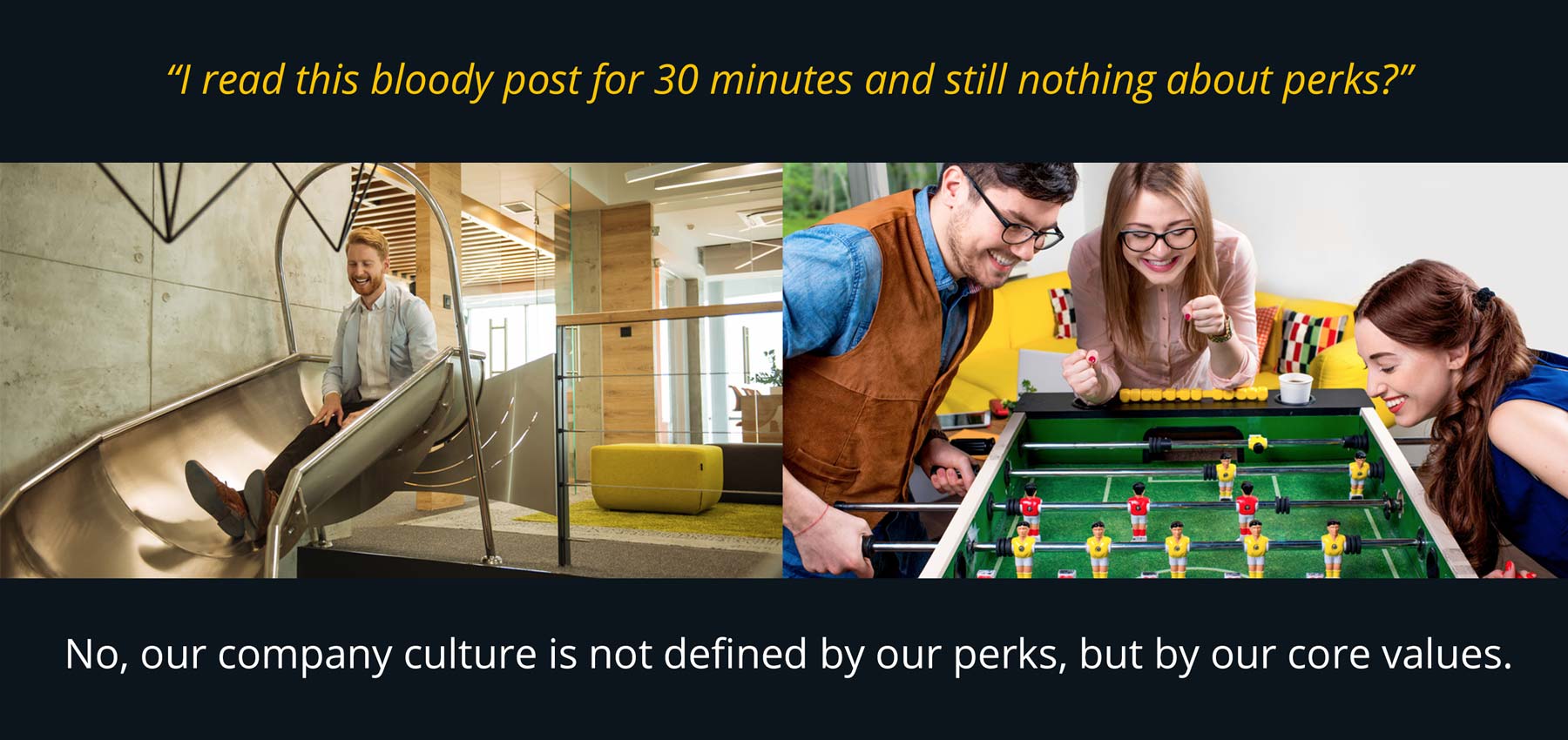
-
Tim Urban compares knowledge of a topic to a tree. If you don’t fully get it, it’s like a tree in your head with no trunk—and without a trunk, when you learn something new about the topic—a new branch or leaf of the tree—there’s nothing for it to hang onto, so it just falls away. By clearing out (knowledge) fog all the way to the bottom, I build a tree trunk in my head, and from then on, all new information can hold on, which makes that topic forever more interesting and productive to learn about. And what I usually find is that so many of the topics I’ve pegged as “boring” in my head are actually just foggy to me—like watching episode 17 of a great show, which would be boring if you didn’t have the tree trunk of the back story and characters in place. http://waitbutwhy.com/2015/06/how-tesla-will-change-your-life.html
↩